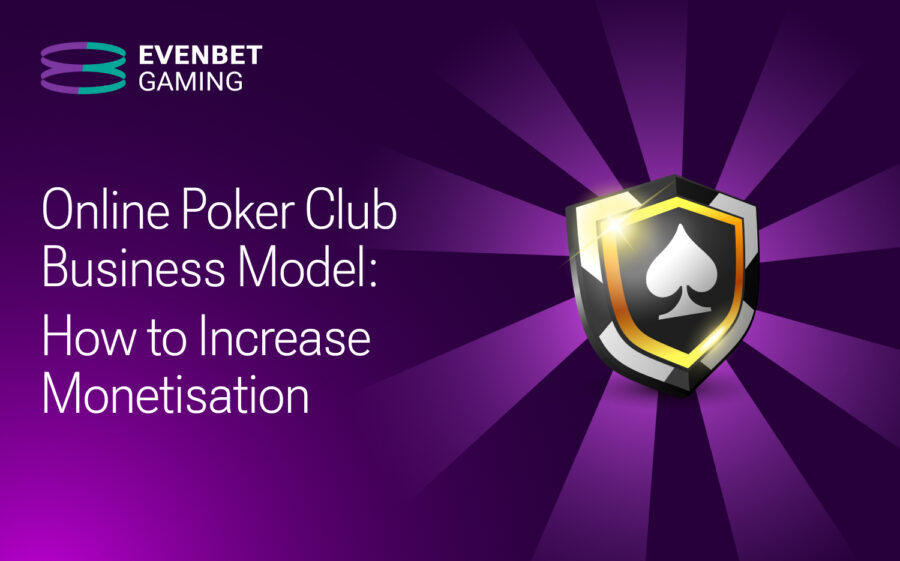EvenBet reveals how a club poker model can help monetise and create a better experience for players

The company shares its insights on how this model maximise player engagement and profitability.
Opinion.- Cards are dealt with a satisfying swoosh, while the chat box on the screen buzzes with friendly banter. This is an online poker club, and players are getting ready to meet those who share their excitement. With the global online gambling market already at USD 305.8 bn, club poker is an excellent opportunity for operators to explore this unique business model.
EvenBet Gaming has been in the industry for 20 years, and its experts know how to create a platform that maximises player engagement and profitability. In this article, they look at the intricacies of the club poker model and how to monetise it while keeping the player ecosystem healthy.
The Workings of the Club Poker Model
Club poker is a paradigm shift in online gaming, moving away from anonymous tables to a community-based approach. For players, club poker is close to a digital version of home games, where players join invite-only groups to enjoy a friendly game. Structure-wise, this model is similar to multi-level marketing with several key players:
- App owners: provide and maintain the overall platform, set monetary policy and in-game purchase costs, manage the entire game database and CRM system, and do not get involved in direct player interaction or game creation.
- Club owners: manage day-to-day club operations and player support, attract and retain players, create engaging playing conditions, define tournament buy-ins, and set up club-specific games.
- Union owners: schedule games and tournaments across multiple clubs, regulate relationships between club members, balance union-wide events with individual club activities, and optimise liquidity across the union.
- Players: participate in games and tournaments, engage with the community, and provide feedback to shape club direction.
Monetisation in club poker typically revolves around three primary streams:
- In-app purchases: the bread and butter for many platforms that encourage regular purchases and offer tiered packages, limited-time offers, and loyalty rewards to drive sales.
- Rake: the classic “house fee” taken from each pot. This strikes a balance between profitability and player satisfaction. It’s not uncommon in club poker to run rake-free or low-rake games.
- Tournament fees: a percentage of entry fees for scheduled tournaments. Tournament offerings can have various buy-in levels, structures, and special events to appeal to a wide range of players. Normally, the whole tournament fee payment process is organised within the club without the app owner’s involvement.
The club poker model provides a seamless and engaging gaming experience that encourages players to come back and boosts their loyalty. EvenBet Gaming offers robust tools for club owners and an immersive environment for players to maximise revenue potential while maintaining long-term player satisfaction.
Why is Club Poker Popular?
In essence, club poker is popular because it allows for intimate, engaging and tailored poker experiences for players who want more than a game — a community.
Club poker has a low entry threshold for businesses, allowing them to begin with little investment and a small player base. The result of this accessibility has been an explosion of clubs catering to different player needs.
A big attraction of club poker for players is its community-driven nature, bringing the same camaraderie found in home games into a digital one. Competing against familiar opponents gives players a sense of belonging and a good, friendly rivalry.
Online gambling is all about trust and security, and club poker does just that. When you play within a known community, you don’t have to worry about unfair play or cheating. Besides, club poker does a great job of providing a personalised player experience. Players are more engaged and feel more valued with custom leaderboards and club-specific events.
From an operational perspective, club poker is cheaper to market. Organic growth happens via word of mouth and member referrals. Club poker apps now take a mobile-first approach, making it easier for players to access the game on the go and integrate with mobile payment systems.
Pros of Club Poker as a Monetisation Model
The club poker model offers several advantages from a monetisation perspective:
- Multiple revenue streams: a poker club can be monetised in many ways, from platform fees and in-app purchases to rake and tournament fees.
- Scalability: rapid growth and increased liquidity of a club can be achieved through forming a union.
- Player loyalty: the “community” aspect allows for long-term engagement and retention of players.
- Cost-effective marketing: word-of-mouth growth eliminates the need for expensive advertising campaigns.
- Customisation: the model can be modified to match different markets and player preferences.
Mitigating Challenges in the Club Poker Model
There are many advantages to club poker, but poker providers need to prepare for possible challenges. We will have a look at these challenges and how to address them.
Market Differentiation in a Saturated Landscape
The popularity of club poker is growing, and providers face much more competition. Operators should create a unique identity for their clubs to stand out in a crowded field. Innovative features, thematic designs or targeting specific demographics of players can be used to achieve this. Clubs can create a niche and attract and keep a loyal player base in competitive markets. For example, focus on fast-paced, short-handed games for professionals or create an atmosphere that brings back the nostalgic feel of old-school poker rooms.
Optimising Liquidity for Consistent Gameplay
For smaller or newer clubs, maintaining a healthy player pool is key to club poker success. Providers should have strategies that maximise liquidity across their network. One way of doing this is to encourage the formation of unions. This allows smaller clubs to have a bigger, more active community by pooling their players. This ensures more consistent game availability and also allows for larger tournaments with bigger prize pools. Cross-club tournaments within a union are another option. These events are exciting for players, can drive up overall activity, and expose players to a wider community.
Navigating the Regulatory Landscape
Online poker is a complex and constantly changing regulatory environment. A major thing is to develop a platform with an adaptable architecture. It helps maintain consistency in modifications through quick changes to suit regulators’ requirements across different jurisdictions. Built-in-age verification, responsible gaming tools, and comprehensive financial reporting should be standard features.
See also: EvenBet Gaming raises funds for Patrizia Foundation through charity Christmas poker tournament
Increasing Monetisation in Club Poker
To boost monetisation in club poker, operators can implement different strategies, here are some examples of player-engaging features:
- “Rabbit Hunting”: an element of excitement that allows players to see cards that would have been dealt if the hand were to continue.
- Advanced statistics: appealing towards serious players, offering detailed metrics, like VPIP (Voluntary Put Money in Pot or how often a user puts in money given the opportunity).
- Customisation: VIP cards with specific player privileges.
- Diverse game offerings: variation of format and stakes to encourage a variety of player preferences.
- Tiered membership or loyalty programmes: developing several levels of privileges and participation in events.
- Robust tournament schedule: having regular events with big prize pools to keep engagement.
Through its comprehensive features and customisation options, EvenBet Gaming allows operators to fine-tune strategies for a maximum return on investment.
Conclusion
The club model is a player-centric approach to the online poker industry that is perfectly suited to current gaming preferences. EvenBet Gaming is a robust platform with a deep understanding of player psychology and gives club owners the power to maximise their potential and create thriving, profitable poker communities.
The club poker model is a unique combination of community engagement and monetisation potential. By focusing on player experience, community-building and innovative features, operators can build thriving ecosystems and generate sustainable revenue.











